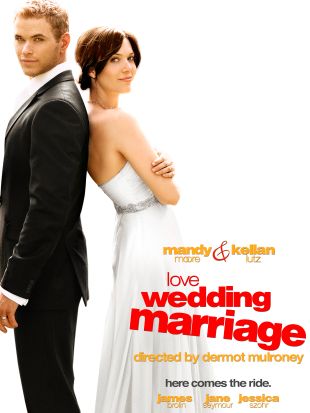
Contrasting the optimism of newlywed bliss with the sour disillusionment of a marriage on the rocks is a great theme. In the literary sphere, for example, Richard Bausch pulled it off with his masterful short story "Letter to the Lady of the House" (1989). In cinema, however, individual examples of this idea done with equal aplomb are difficult to think of. The Mandy Moore-Kellan Lutz comedy drama Love Wedding Marriage will not do anything to change that. The movie tries to get at the same concept but feels klutzy and naïve, and even lacks the courage to follow through on its initial convictions, instead lunging toward an inexplicably sunny denouement that ruins whatever chance for real insight and complexity it originally had.
Moore stars as Ava, a marriage counselor in her late twenties who weds the man of her dreams, vintner Charlie (Lutz). Young, gorgeous, in love, and well-to-do (Charlie runs a sprawling vineyard), it seems that they couldn't possibly be more joyful. Then life throws a wrench into Ava's happiness -- she suddenly receives the news that her parents, Bradley and Betty (James Brolin and Jane Seymour), have decided to file for divorce after 31 years of marriage. Indignant, Ava sets out to convince them to stay together. Then unforeseen issues begin to crop up in Ava and Charlie's own marriage -- and it seems that wedded life isn't nearly as simple or transparent as Ava had assumed.

These early assumptions represent one of the movie's core problems: some young people may still buy into fantasies of married nirvana (especially if repeatedly exposed to movies as silly as this one), but the fact that the screenwriters made Ava a marriage counselor sets the bar unusually high in terms of intelligence and wisdom, and the character fails to clear it -- she isn't remotely credible in this occupation. In her therapy sessions with clients, Ava specializes in two-dimensional aphorisms such as "Let's try and reconnect with some of those feelings you had when you first decided to get married." It's difficult to believe that a trained and licensed psychologist with an emphasis on marriage counseling would be so simple-minded. And if this greenness is a challenge to swallow in the counseling scenes, it grows risible when Ava reacts to a friend's quickie marriage to an immigrant by continually praising how "in love" they are -- despite all evidence to the contrary.
To be fair, Moore and her co-stars are often so amiable that one wants to overlook the initial implausibility surrounding Ava's character. But that doesn't work, either. The whole gestalt of the movie appears to be built to transition Ava from a state of unblemished naïveté about relationships to a deeper and more thorough adult realization that, sometimes, marriages simply die and cannot be salvaged, no matter how many platitudes an earnest counselor throws out. The oddest thing about the film, though, is its unwillingness to sustain this idea. The movie's resolution hinges on a crazy scheme that Ava dreams up to drive her parents back into each other's arms -- one that seems only a hair or two removed from the conceit of Disney's Parent Trap series. The developments are ludicrous, and the outcome even more so. It also has the adverse effect of reinforcing every feather-brained assumption about relationships that Ava had in the movie's first act.

To the credit of first-time director Dermot Mulroney and scriptwriters Caprice Crane and Anouska Chydzik, not everything in the film feels unsuccessful. For instance, a very sweet and touching prologue -- shot from the perspective of a homemade video diary -- persuasively brings across the trepidation associated with Charlie popping the question to Ava. Brolin also earns a few laughs. He has one hysterically funny scene that satirizes more earnest movie singalongs -- in which Bradley does tone-deaf karaoke to the Orleans tune "Still the One" -- that temporarily kicks the entire movie up a few notches.
The character of Bradley is problematic, however, due to an unusual quirk he has -- an overwhelming interest in Orthodox Judaism. The filmmakers inexplicably take repeated potshots at his faith that come off as unfunny and inappropriate. And some of the film's other attempts at comedic relief are played so broadly that they clash with the rest of the material. Christopher Lloyd and Colleen Camp, for example, each do cameos as nutty marriage counselors, and these scenes seem laden with comedic possibilities -- but they belong in another movie.

In the final analysis, while one can see why Love Wedding Marriage looked promising on paper, it's a botched effort on all levels. Mulroney may very well have a long and successful directorial career ahead of him, but only if producers can look past this misfire.
